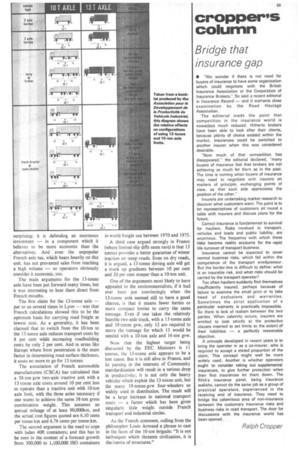cropper's column
Page 55

If you've noticed an error in this article please click here to report it so we can fix it.
Bridge that insurance gap
• "We wonder if there is not need for buyers of insurance to have some organization which could negotiate with the British Insurance Association or the Corporation of Insurance Brokers." So said a recent editorial in Insurance Record — and it warrants close examination by the Road Haulage Association.
The editorial made the point that competition in the insurance world is nowadays much reduced. Hitherto brokers have been able to look after their clients, because plenty of choice existed within the market. Insurances could be switched to another insurer when this was considered desirable.
"Now much of that competition has disappeared," the editorial declared, "many buyers of insurance feel that brokers are not achieving as much for them as in the past. The time is coming when buyers of insurance may need to negotiate with insurers on matters of principle, exchanging points of view, so that each side appreciates the position of the other."
Insurers are undertaking market research to discover what customers want. The point is to let representatives of customers sit round a table with insurers and discuss plans for the future.
Correct insurance is fundamental to survival for hauliers. Risks involved in transport, vehicles and loads and public liability, are enormous. The frequency with which these risks become reality accounts for the rapid life-turnover of transport business.
Insurance cannot be expected to cover normal business risks, which fall within the competence of the transport entrepreneur. But the border-line is difficult to define: what is an insurable risk, and what risks should be carried by the transport operator?
Too often hauliers suddenly find themselves insufficiently insured, perhaps because of failure to examine the small print or to take heed of exclusions and warranties. Sometimes the strict application of a particular warranty is practically impossible. So there is lack of realism between the two parties. When calamity occurs, insurers are entitled to look strictly at the protective clauses inserted to set limits to the extent of their liabilities — a perfectly reasonable objective, A principle developed in recent years is to bringthe operator in as a co-insurer, who is required to accept a stated proportion of the claim. This concept might well be more widely used. Another is whether operators ought to consider taking Out supplemental insurances, to give further protection when their first insurances let them down. The RHA's insurance panel, being insurance wallahs, cannot do the same job as a group of practical operators, experienced in the receiving end of insurance. They need to bridge the calamitous area of non-insurance between the customary insurance risks and business risks in road transport. The door for discussions with the insurance world has been opened.
Ralph Cropper












































































































